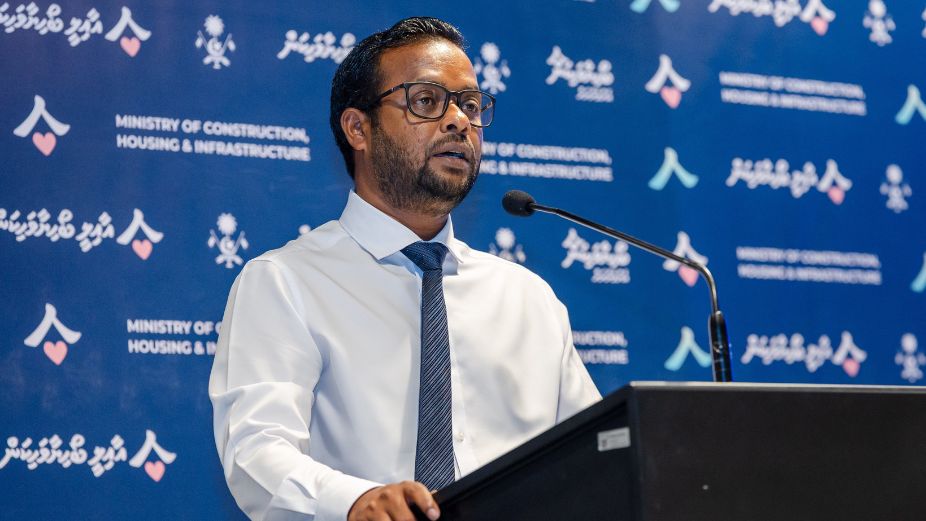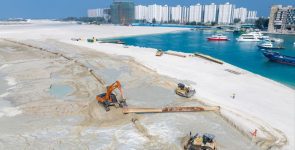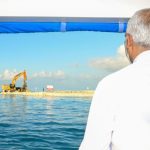
The Ministry of Construction, Housing and Infrastructure yesterday publicised policies for the “Housing for All” scheme, under which land and flats will be allocated from Malé and Rasmalé.
The Ministry released two policies: the Residential Land for Malé Residents Policy, detailing the distribution of land plots, and the Flat Allocation Policy for Malé Residents, outlining the allocation of flats. The land policy provides 15,000 plots for Malé residents aged 18 and above, either within the Greater Malé Area or in Rasmalé, which is still in early reclamation stages.
The applications for both these schemes will be opened on January 4, 2026, until March 3, 2026.
The scheme targets four groups:
- Individuals able to purchase housing or land through business policies;
- Middle-class families seeking affordable housing;
- Those who cannot buy property but qualify for a rent-to-own model;
- Individuals who cannot afford to buy or rent, identified through a government assessment.
Land applicants fall into two categories. Category 1 covers “Malé natives” who have lived in the city for at least five years and do not own land exceeding 400 square feet; smaller holdings must be relinquished through a government process. Category 2 includes long-term Malé residents from other islands who have lived in the city for 15 years or more and meet the same ownership conditions. Public criticism has highlighted that the policy allocates land differently between these categories.
Under Chapter Two of the Residential Land Policy, Malé natives may receive land in Rasmalé or across the Greater Malé Area — including Malé, Vilimalé, Hulhumalé Phases 1–3, Gulhifalhu, Thilafushi, and Giraavaru Falhu — whereas long-term Malé residents are limited to plots in Rasmalé.
Malé natives are defined as individuals registered to an address in Malé from birth, listed in the Malé registry without housing, or from other islands who later registered to an address in Malé. In a separate notice, the Ministry outlined the number of land plots to be allocated according to applicant category. Those registered in Malé from birth will receive 7,000 land plots, while those who later registered a Malé address will receive 2,000 plots. Applicants listed in the Malé registry without housing are allocated 1,000 plots, and long-term Malé residents will receive 3,000 plots. Additionally, people who are unable to inherit land due to the death of a parent will be allocated 500 land plots, while those who own small plots on narrow roads, face difficulties in developing them, and agree to transfer their land to the government will be allocated 1,500 land plots.
Eligibility requires relinquishing any inherited land or housing and excludes anyone who sold government-allocated land or housing in the past five years or benefited from previous schemes such as Veshifahi Malé or Binveriyaa.
Flats will be distributed under two models: affordable home ownership and rent-to-own. The affordable model offers subsidised flats to first-time homebuyers meeting financial institution requirements. The rent-to-own model is available for applicants earning less than MVR 60,000 per month, who may also choose the affordable ownership option if eligible.
Although the Flat Allocation Policy for Malé Residents does not specify allocation areas, a separate notice sets out the distribution of flats. Those registered in Malé from birth will receive 2,500 flats, while those who later registered a Malé address will receive 500 flats. Applicants listed in the Malé registry without housing are allocated 1,000 flats, and long-term Malé residents will receive 1,500 flats. An additional 1,700 flats are allocated to specific groups, including people with disabilities, single parents with children under 18, Maldives Police Service employees, and military personnel, with a further 300 flats designated for employees from various state institutions. Applicants whose spouses received government housing, or who own flats or sold government land within the past five years, are ineligible.
While the scheme meets President Dr Mohamed Muizzu’s pledge to provide housing for both Malé natives and residents, it falls short of ensuring equal access across all groups, one of his key pledges. Under the previous administration’s Binveriyaa scheme, long-term Malé residents could apply for Greater Malé plots in a second round, which the change in administration prevented











